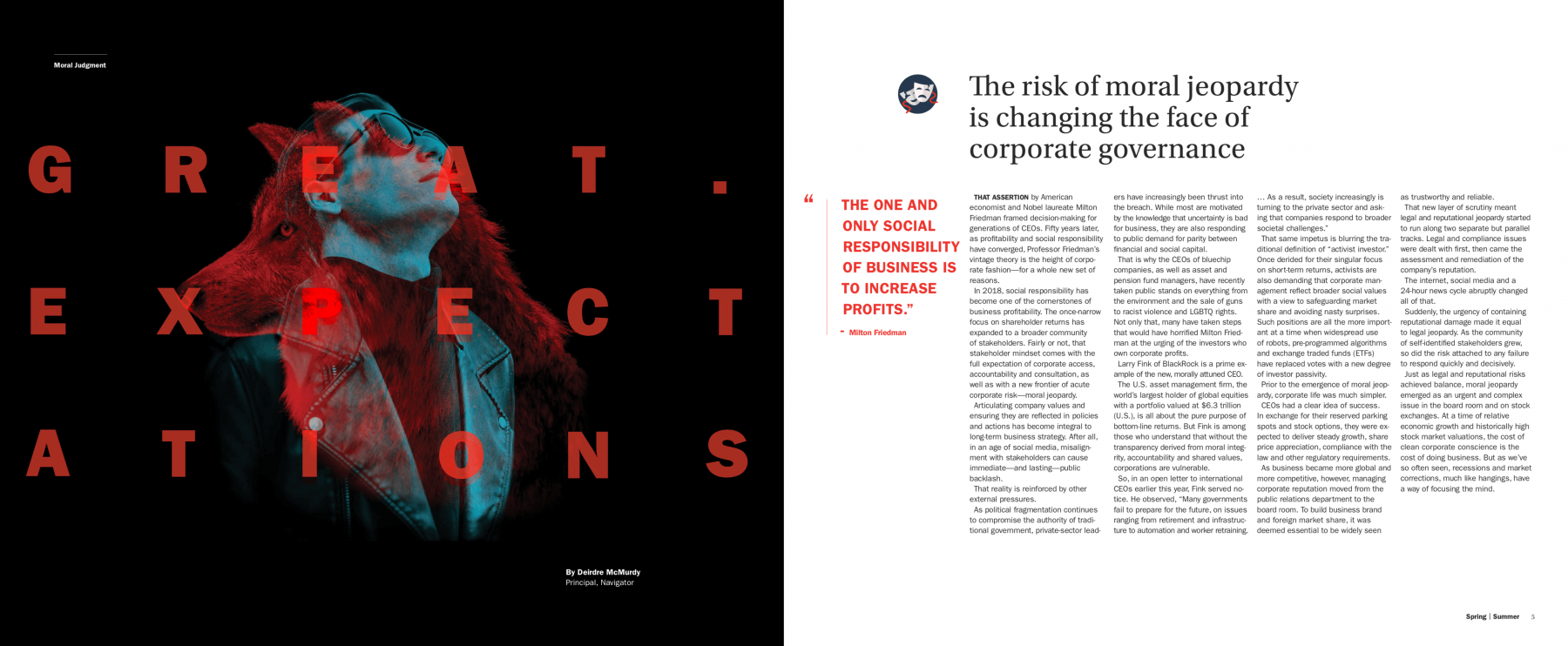- CEOCap
- Jaime Watt’s Debut Bestseller ‘What I Wish I Said’
- Media Training
- The Push Back
- Internship program
- Update Your Profile
- Homepage
- It’s time for a change
- It’s time for a change
- Kio
- Ottawa
- Art at Navigator
- Navigator Limited Ontario Accessibility Policy
- Virtual Retreat 2020 Closing Remarks
- COVID-19 Resources
- Offices
- Navigator Sight: COVID-19 Monitor
- Navigator Sight: COVID-19 Monitor – Archive
- Privacy Policy
- Research Privacy Policy
- Canadian Centre for the Purpose of the Corporation
- Chairman’s desk
- ELXN44
- Media
- Perspectives
- Podcasts
- Subscribe
- Crisis
- Reputation
- Government relations
- Public affairs campaigns
- Capital markets
- Discover
- studio
- How we win
- What we believe
- Who we are
- Careers
- Newsroom
- AI
- Empower by Navigator
- Environmental responsibility

“The one and only social responsibility of business is to increase profits.”
That assertion by American economist and Nobel laureate Milton Friedman framed decision-making for generations of CEOs. Fifty years later, as profitability and social responsibility have converged, Professor Friedman’s vintage theory is the height of corporate fashion—for a whole new set of reasons.
In 2018, social responsibility has become one of the cornerstones of business profitability. The once-narrow focus on shareholder returns has expanded to a broader community of stakeholders. Fairly or not, that stakeholder mindset comes with the full expectation of corporate access, accountability and consultation, as well as with a new frontier of acute corporate risk—moral jeopardy.
Articulating company values and ensuring they are reflected in policies and actions has become integral to long-term business strategy. After all, in an age of social media, misalignment with stakeholders can cause immediate—and lasting—public backlash.
That reality is reinforced by other external pressures.
As political fragmentation continues to compromise the authority of traditional government, private-sector leaders have increasingly been thrust into the breach. While most are motivated by the knowledge that uncertainty is bad for business, they are also responding to public demand for parity between financial and social capital.
That is why the CEOs of bluechip companies, as well as asset and pension fund managers, have recently taken public stands on everything from the environment and the sale of guns to racist violence and LGBTQ rights. Not only that, many have taken steps that would have horrified Milton Friedman at the urging of the investors who own corporate profits.
Larry Fink of BlackRock is a prime example of the new, morally attuned CEO.
The U.S. asset management firm, the world’s largest holder of global equities with a portfolio valued at $6.3 trillion (U.S.), is all about the pure purpose of bottom-line returns. But Fink is among those who understand that without the transparency derived from moral integrity, accountability and shared values, corporations are vulnerable.
So, in an open letter to international CEOs earlier this year, Fink served notice. He observed, “Many governments fail to prepare for the future, on issues ranging from retirement and infrastructure to automation and worker retraining. As a result, society increasingly is turning to the private sector and asking that companies respond to broader societal challenges.”
That same impetus is blurring the traditional definition of “activist investor.” Once derided for their singular focus on short-term returns, activists are also demanding that corporate management reflect broader social values with a view to safeguarding market share and avoiding nasty surprises. Such positions are all the more important at a time when widespread use of robots, pre-programmed algorithms and exchange traded funds (ETFs) have replaced votes with a new degree of investor passivity.
Prior to the emergence of moral jeopardy, corporate life was much simpler.
CEOs had a clear idea of success. In exchange for their reserved parking spots and stock options, they were expected to. deliver steady growth, share price appreciation, compliance with the law and other regulatory requirements.
As business became more global and more competitive, however, managing corporate reputation moved from the public relations department to the board room. To build business brand and foreign market share, it was deemed essential to be widely seen as trustworthy and reliable.
That new layer of scrutiny meant legal and reputational jeopardy started to run along two separate but parallel tracks. Legal and compliance issues were dealt with first, then came the assessment and remediation of the company’s reputation.
The internet, social media and a 24-hour news cycle abruptly changed all of that.
Suddenly, the urgency of containing reputational damage made it equal to legal jeopardy. As the community of self-identified stakeholders grew, so did the risk attached to any failure to respond quickly and decisively.
Just as legal and reputational risks achieved balance, moral jeopardy emerged as an urgent and complex issue in the board room and on stock exchanges. At a time of relative economic growth and historically high stock market valuations, the cost of clean corporate conscience is the cost of doing business. But as we’ve so often seen, recessions and market corrections, much like hangings, have a way of focusing the mind.
